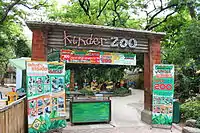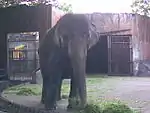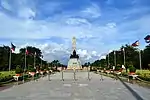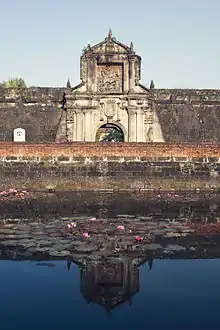Manila Zoo
The Manila Zoo, formally known as the Manila Zoological and Botanical Garden,[3] is a 5.5-hectare (14-acre) zoo located in Malate, Manila, Philippines that opened on July 25, 1959.[1]
 The entrance to Manila Zoo | |
| Date opened | July 25, 1959[1] |
|---|---|
| Date closed | January 21, 2019 (temporary) |
| Location | Adriatico Street, Malate, Manila, Philippines |
| Coordinates | 14.5647412°N 120.9886014°E |
| Land area | 5.5 hectares (14 acres)[1] |
| No. of animals | ~1000 (2015) |
| No. of species | 90 (2015) |
| Annual visitors | 480,000+ [2] |
| Public transit access | Rail: |
History
The Manila Zoological and Botanical Garden first opened to the public on July 25, 1959.[1]
Animals

The Manila Zoological and Botanical Garden is home to about a thousand animals from 90 species as of April 2015.[2] The zoo's most popular resident is Mali, an Asian elephant who arrived at the zoo in 1977 as 3 year old calf trans ported from Sri Lanka, after her herd abandoned her and saved by pinnawala elephant orphanage from the jungle.[4]
Other Animals residing in Manila Zoo includes a Bengal tiger, Malayan civet, monitor lizard and hippopotamus. Many of the animals of the zoo were born in captivity with three month-old juveniles recently born in April 2015. The zoo management is planning to transfer many of its animals to a separate breeding area or sanctuary outside Metro Manila due to over congestion in the zoo. The zoo is planned to be just an exhibit area.[2]
Facilities
Wildlife Rescue Center
The Wildlife Rescue Center serves as temporary shelter and repository for confiscated, donated, retrieved, sick, injured and abandoned wildlife species. The Wildlife Rescue Center has been the subject of public scrutiny in regard to their animal welfare standards.[5]
Botanical Garden
The Manila Zoological and Botanical Garden is home to many plant collections, from the botanically rich and diverse Philippine Islands and South Pacific region.
Kinder Zoo

The Kinder Zoo within Manila Zoo was a result of a private-public partnership between Kinder Zoo, Inc. and the city government. Kinder Zoo, Inc. redeveloped 3,000 square metres (32,000 sq ft) of the zoo into an area named Kinder Zoo. The area was designed as a child-friendly area where children can interact with some animals of the zoo. The area featured a butterfly sanctuary, a hanging bridge, a flamingo pond, a barn for events, and a petting zoo upon its opening on June 23, 2000.[6] [7]
Criticism

The zoo has been criticized due to its inadequate animal care[8] and dirty surroundings.[9] The zoo is responding with efforts to make the animal habitats as comfortable and natural as possible, such as by adding trees and vegetation, and expanding the enclosures.
Treatment of Mali the Elephant
Mali is the only Elephant in the Manila zoo, known as the world's loneliest elephant and the only captive elephant in the Philippines, and she is the subject of a campaign from animal rights organization, People for the Ethical Treatment of Animals (PeTA).[10] A report issued by PeTA points out the numerous issues regarding Mali being kept in captivity.[11]
Calls for the closure of the zoo
In 2007 PeTA called for the boycott and closure of Manila Zoo as part of its global campaign against zoos claiming that zoos are never beneficial to animals. The animal rights group supported proposals to convert the zoo into a sporting coliseum to be used by the Philippine Basketball Association. Some local vendors operating in the zoo opposed PeTA's calls citing its negative effect on their livelihood and then Mayor Alfredo Lim said calls to close the zoo, which he described as a city landmark, were unwarranted and claimed that the zoo's animals were well taken care of.[8][12][13]
2019 closure
From January 21, 2019, Manila Zoo was ordered an indefinite closure until further notice by Manila Mayor Joseph Estrada after the Department of Environment and Natural Resources (DENR) identified it as a major pollutant of Manila Bay.[14] The zoo was closed to the public from January 23, 2019 with construction of water treatment facilities and sewerage treatment plants since the zoo was found to be dumping untreated sewage into an estuary that empties into the bay.[15][16]
Rehabilitation
During the administration of Mayor Estrada, it was reported that a total of 1.5 billion pesos would be allocated for the rehabilitation of the 5.5 hectare botanical park. However, this project was put on hold.[17][18]
Plans for the rehabilitation of the zoo once again surfaced following the election of Isko Moreno as mayor.[19] On July 2020, a groundbreaking ceremony was held for the rehabilitation and redevelopment of the zoo. The project's budget is 1.7 billion pesos and is expected to be finished in 19 months. The future zoo would feature a 30-foot waterfall in the lagoon, a big cat enclosure, a Philippine endemic marsupial exhibit, a monkey enclosure and a restaurant.[20][21]
References
- "Manila Zoological and Botanical Garden". Manila City Government. Manila City Government. Archived from the original on 1 May 2015. Retrieved 28 May 2015.
- Manongdo, Jenny. "Major facelift in the offing for aging Manila Zoo". Manila Bulletin. Retrieved 28 May 2015.
- Melican, Nathaniel (22 May 2015). "P1.5-B rehab program to turn Manila Zoo into world-class attraction starts in July". Philippine Daily Inquirer. Retrieved 28 May 2015.
- Parry, Tom (22 July 2012). "All by myself: World's loneliest elephant kept in solitary for 35 years". Mirror. Retrieved 28 May 2015.
- Almazan, Ronnel R.; Rubio, Roberto P.; Agoramoorthy, Govindasamy (2005). "Welfare Evaluations of Nonhuman Animals in Selected Zoos in the Philippines". Journal of Applied Animal Welfare Science. 8 (1): 59–68. doi:10.1207/s15327604jaws0801_5. PMID 16004545.
- Enriquez, Marge (4 August 2000). "A gentler, kinder zoo". Philippine Daily Inquirer - Lifestyle. p. 4. Retrieved 28 May 2015.
- Enriquez, Marge (4 August 2000). "A gentler, kinder zoo". Philippine Daily Inquirer - Lifestyle. p. 6. Retrieved 28 May 2015.
- "Manila Zoo won't be closed down - Lim". GMA News. 14 September 2007. Retrieved 28 May 2015.
- "Activists bare naked truth about Manila Zoo". abs-cbnNEWS.com. April 28, 2009. Retrieved December 17, 2010.
- "Mali Needs Your Help". PETAAsiaPacific.com. PETA Asia Ltd. Retrieved 28 May 2015.
- "Mali: The Manila Zoo's Aging and Ailing Elephant" (PDF). PETA Asia Pacific. 17 September 2009. Archived from the original (PDF) on 17 May 2013. Retrieved 4 July 2012. Cite journal requires
|journal=(help) - Santos, Tina (14 September 2007). "Peta presses campaign for zoo closure". Philippine Daily Inquirer. Retrieved 28 May 2015.
- Basco, Humberto (12 July 2007). "No to conversion of zoo into coliseum". Philippine Daily Inquirer. Retrieved 28 May 2015.
- "Manila Zoo shut down indefinitely due to untreated sewage". philstar.com. Retrieved 2019-07-04.
- Rappler.com. "LOOK: Manila Zoo closed 'until further notice'". Rappler. Retrieved 2019-07-04.
- Inc, Primer Media. "Manila Zoo Closed for Construction of Water Facility". Blog. Retrieved 2019-07-04.
- "Manila Zoo soon to be world class after rehabilitation". Kicker Daily News. Retrieved June 2, 2015.
- Tayao-Juego, Annelle. "Mayor Estrada promise of Manila Zoo rehab on hold". newsinfo.inquirer.net.
- Orellana, Faye. "Mayor Isko to 'redevelop,' 'repackage' Manila Zoo". newsinfo.inquirer.net. Retrieved 2019-07-04.
- "P1.7-B rehab of Manila Zoo starts". Philippine Daily Inquirer. July 26, 2020. Retrieved July 29, 2020.
- Pedrajas, Joseph Almer (July 25, 2020). "Mayor Isko breaks ground for new Manila Zoo". Manila Bulletin. Retrieved July 29, 2020.
| Wikimedia Commons has media related to Manila Zoological and Botanical Garden. |


